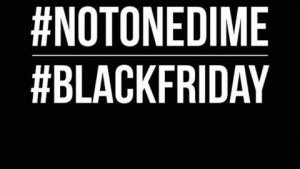
Using the hashtag #NotOneDime, thousands of Americans, led by Rahiel Tesfamariam and Urban Cusp magazine, are encouraging a nationwide economic boycott of Black Friday to bring necessary focus to racial justice in the U.S. The campaign, created following the decision not to indict Darren Wilson, the police officer who killed Michael Brown in Ferguson, Missouri earlier this year, urges all Americans, but specifically, Blacks, to refrain from non-essential purchases between November 26 and 30.
“We are trying to reset some folks’ minds within our own community so that they understand how their money is tied to their oppression,” activist and #NotOneDime supporter Kwame Harper told the AFRO.
“New shoes, luxury items, a new anything if the old thing is not broken beyond repair, are not necessities. In a battle for your pride, you have to make sacrifices and how we handle our money is directly linked to how others handle us. If you must shop, support local Blackowned business.”
Other anti-spending movements include No Spend November and Buy Nothing Day.
According to NotOneDime, Blacks contribute $1.1 trillion in annual buying power, to undergird the economy of the nation; yet continue to be treated as second-class citizens. In addition Black and Hispanic students are involved in more than 70 percent of school-related arrests or referrals to law enforcement; with Blacks making up only 12 percent of drug users, but 59 percent of those in state prison for drug offenses.
Using such data as a catalyst for dialogue and collective bargaining, NotOneDime supporters hope to make a noticeable negative dent in the nation’s economy and ensure parity in policymaking that impacts Black communities.
NotOneDime developed a list of demands for corporations that includes: Meeting with racial justice community organizers that are leading the #NotOneDime campaign to assess the company’s current practices and racial justice commitments in hopes of developing better modes of operation; divesting from the private prison industry; and creating economic incubators in urban communities that educate on financial literacy, offer support to minority entrepreneurs, and fund local Black and Brown-owned small businesses.

